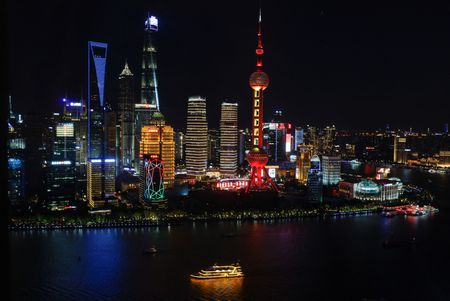By Siyi Liu, Trixie Yap and Chen Aizhu
SINGAPORE (Reuters) -Recent U.S. sanctions on two small Chinese refiners for buying Iranian oil have created difficulties receiving crude and led them to sell product under other names, sources familiar with the matter said, evidence of the disruption that Washington’s stepped-up pressure is inflicting on Tehran’s biggest oil buyer.
The targeting of independent refiners, known as teapots, marked an escalation in Washington’s efforts to cut off Tehran’s export revenue as President Donald Trump seeks to pressure Iran into a deal over its nuclear programme.
Washington’s sanctions against Shandong Shouguang Luqing Petrochemical in March and Shandong Shengxing Chemical in April have also begun to deter other, larger independent Chinese refiners from buying Iranian crude, three of the sources said.
About five plants in the refining hub of Shandong province have halted purchases of Iranian oil since last month, worried about being hit by sanctions, two trading executives said. That wariness is the main reason discounts for Iranian Light have widened to $2.30-$2.40 a barrel against ICE Brent from about $2 a month ago, the executives and another source said.
Among the inconveniences faced by the two sanctioned teapots, state-run Shandong Port Group, the main port operator in the province, has denied entry to vessels loaded with crude they have purchased, five trade sources said. That follows the port group’s January ban on port calls by U.S.-sanctioned tankers.
Shandong Port Group and Shengxing did not respond to requests for comment. A Luqing executive declined to comment.
Large state banks have also stopped providing Luqing with operational capital for purchasing crude, forcing it to work with smaller banks, four of the sources said.
The sources declined to be identified due to the sensitivity of the matter.
Beijing says it opposes unilateral sanctions and defends as legitimate its trade with Iran, which ships about 90% of its oil exports to China. However, Chinese customs data has not shown any oil shipped from Iran since July 2022, with Iranian crude imports instead labelled as originating from Malaysia or other countries.
SHIPPING, SALES HEADACHES
The Shandong Port Group’s banning of cargoes for the two refineries has forced them to discharge at other ports, according to three sources.
In one case, the tanker Bei Hai Ming Wang carrying oil for the Shengxing refinery was rejected when it sought to land at the Laizhou port, controlled by Shandong Port Group, around April 21, according to a source familiar with the matter.
It eventually unloaded on May 2 at the privately owned Wantong Crude Oil Terminal in neighbouring Dongying, data from analytics firm Vortexa showed.
In another sign of trading disruption from the sanctions, two Asia-based oil product traders who had previously dealt with Luqing said they stopped doing so after it was sanctioned.
In addition, no shipments of gasoline blendstock have been recorded since the end of March out of Laizhou port, used by Luqing for most of its blendstock exports, Kpler and LSEG shiptracking data showed.
That contrasts with the first three months of this year when 83,000 metric tons (701,000 barrels) of methyl tertiary butyl ether, a key gasoline blendstock export, were shipped from Laizhou, accounting for 15% of China’s total outflow of the blendstock.
State giant CNOOC stopped supplying crude to Shandong Haihua Group’s 40,000 barrel-per-day refinery, operated by Luqing, shortly after the U.S. sanctions were announced, three trade sources and a Shandong-based Chinese oil market consultant said.
CNOOC did not respond to a request for comment. Calls to Haihua went unanswered.
The two teapots have also begun selling product through new entities, according to seven trade sources, with Luqing using Shouguang Jiaqing Petroleum Sales and Shengxing selling via Shandong Xuxing Petrochemical. Calls to the two entities seeking comment went unanswered.
(Reporting by Siyi Liu, Trixie Yap and Chen Aizhu in Singapore; Additional reporting by Beijing Newsroom; Editing by Florence Tan, Tony Munroe and Edmund Klamann)










